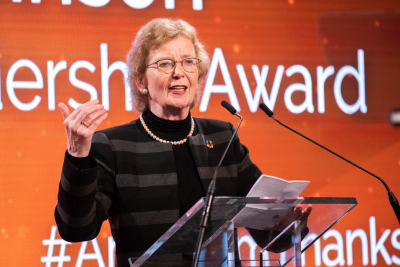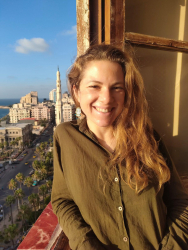


The Honorable Mary Robinson was peremptory: “We need to communicate the climate crisis much better, and with a climate justice approach." The former President of Ireland and UN Commissioner for Human Rights, presented her keynote on 'Inclusive excellence and climate justice' in the opening session of the Triennial Conference of the InterAcademy Partnership (IAP) and the Worldwide Meeting of the Young Academies, which took place at Biosphere 2, Arizona, USA, from 1-3 November 2022.
“Historically and today, rich countries account for a very large share in the emission of greenhouse gases and poor countries are disproportionately affected by the impact of the climate crisis. But we tend to talk about this in a neutral way, as being human induced," she pointed out, further explaining that “the time has come to acknowledge the layers of injustice.”
First of all, the climate crisis has disproportionately - and for much longer - affected the poorest countries, the poorest communities, the small island states and the indigenous people of our world. This results in a racial injustice. But it also results in a gender injustice, because women are less present at the decision-making table, and in some countries they have fewer rights (including land rights), and yet “they are the ones putting food on the table and making their communities resilient.” The third layer is the inter-generational injustice, because “we are not taking decisions now, when we should be, and we are loading the future of the next generations with an impossibility,” Mrs. Robinson lamented. Fourthly, the climate crisis is undermining the ability of countries to move in the right direction, because they are losing resources and exacerbating their debts. While the economies of industrialized countries were built on fossil fuel, “our task now is to honour the workers in this sector, but also to transition into clean energy.” Finally, the fifth injustice is the one to nature herself: the loss of biodiversity, ocean acidification and the mass extinction of species that scientists are documenting.
Ireland's most popular president to date has no doubts: according to Robinson, “scientists should talk more about justice, because people don’t change their behaviour on the basis of science and statistics. They change from the heart, because they see the human-people-centered dimension to a problem.”
Robinson urged the need of a “moonshot” mentality, referring to the approach that John F. Kennedy had in putting a man on the moon, announcing the goal when everybody said it would be impossible. Accordingly, “We have to reduce by at least 45% global carbon emissions by 2030 to be on track for a net zero by 2050.”
As the 7th president of Ireland and first woman to hold this office, the Honorable Mary Robinson celebrated that women are gradually managing to occupy more space and have increasing influence in the climate struggle as well as in the management of many other global crises. “We decided to have a feminine and feminist approach to the moonshot," she announced, explaining the latest climate justice movement taking root: Project Dandelion, the next phase of climate justice work, that is being led by women. A little yellow flower, the dandelion is the only weed that grows on all continents, and it’s very resilient. In fact, “the narrative that we have for ourselves in Project Dandelion is a very positive one, because the doom and gloom narrative does not energize people.” She then reiterated how education is absolutely fundamental in managing climate urgency, "with a positive approach, too. I am worried for mental health of young people when they hear this constant refrain of doom and gloom,” Robinson highlighted.
But women leaders will not solve the issue on their own. They will join with “scientists and climate activists and with indigenous communities and artists... We want to push the governments and the fossil fuel industry to move much more rapidly. We need to get out of the 'silos' vision and move to a climate justice movement,” she concluded.
The complete agenda of The Worldwide Meeting of the Young Academies is available here.
